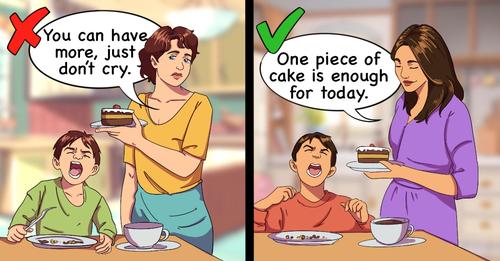
Remember those blissful days when your baby was quiet, happy and obedient? Now they’re screaming, crying and won’t listen to a word you say. If your life has descended into chaos because of your child being taken over by a mini monster, we feel you! As children grow and develop, they encounter a range of emotions and behavioral changes that can leave parents feeling like they’re dealing with a little monster. While it may be challenging, it’s crucial to remember that these changes are typically a part of a child’s natural development. In this article, we’ll explore some effective strategies to help parents walk through this phase with ease. Read on to know them all!
1. Anticipate Issues
We’re sorry to burst your bubble but children are not angels. All children face behavioral issues at one stage or another. There will be times when they don’t listen and can’t care about the consequences because at the end of the day they are just little people trying to figure the world out. After a while you will have a good idea of what kind of situations trigger negative emotions and outbursts in your little one. For example, if your toddler starts to whine when it’s time to leave the park, speak to them before you leave the house and communicate what kind of behavior you expect from them. Establish a system that works for the both of you like a countdown. Give them a warning when there’s only 2 minutes left so they know when to wrap up play and are expected to go home.
2. Show Your Child The Connection Between Action And Consequence
Children don’t really respond well to threats or lectures. In order to put a stop to bad behavior they have to see real consequences due to their actions. This is the only way they will recognize that they’ve done something wrong. This technique will also help your child understand how the world works. It will make them independent, accountable and responsible as they will be able to foresee the outcome of their actions and decide if a 5 minute outburst is worth the pain.
This means that parents shouldn’t try to prevent their child from facing the natural consequences of their actions. Sheltering them this way will not benefit them. In fact, it will give them an excuse to carry on with unpleasant behavior. So, don’t intercept or take the blame for your child. Sometimes, letting them face the music is the best thing you can do for them.
3. Reinforce Good Behavior In Order To Keep Them From Acting Out
Little ones love to focus on the positives, so use this strategy to your advantage. Rather than reprimanding them about negative behavior, show approval when they practice positive behavior. One great way to avoid or get rid of unpleasant behavior is to teach your child what kind of behavior you want them to exhibit instead. This also means leading by example and sticking to your word. If they are not allowed to yell at people, neither are you. Shouting at your child for screaming will do nothing but confuse them. Instead show them how to interact with people appropriately and how to express their concerns in socially appropriate ways.
4. Don’t Forget That You’re An Adult So Don’t Indulge In Childish Behavior
Kids can really bring out the worst in you sometimes. They know exactly how to get on your last nerve and press every button. But just because they’re being childish, doesn’t mean you should stoop to their level. You’re the adult, the parent and the one who can gain control over the situation. Remember this isn’t a power struggle. This is about handling things the right way. This means that you stay in adult mode no matter how big a fit your child throws. If parents feel irritated or desperate, this means that they are no longer in the adult position or they don’t have the situation under control. The second you start to feel helpless or like you are bartering with your child instead of laying down the rules, step away. Let your child cry it out and come back with your composure intact.
It’s okay if you feel overwhelmed and frustrated with our kids from time to time. Keeping them from turning into monsters is hard work and can take a toll on you. The most important thing is to try to get through to them in healthy ways. This phase won’t last forever so cheer up and happy parenting!




